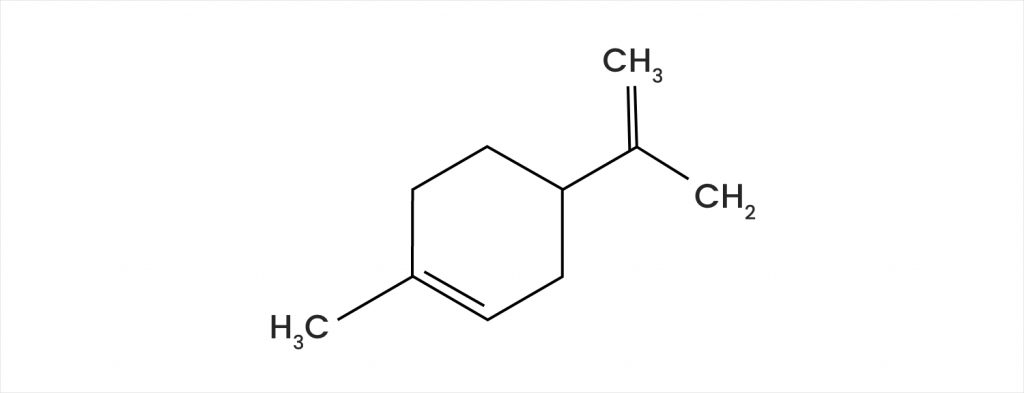
What Is Limonene?
The name ‘limonene’ was derived from the name of lemon. Limonene is classified as a cyclic monoterpene. It is one of the most common terpenes in nature. Terpenes are thought to be produced by plants to deter predators and protect the plants from pests.

In addition to its uses in cosmetics and skincare formulations, limonene is also used as a food additive to improve the scent and taste. It is also used in natural insect repellent formulations.

Limonene
the good: Limonene helps to improve the scent and taste of cosmetic and skincare formulations. It may also have added benefits, acting as an antioxidant and soothing ingredient.
the not so good: It can cause sensitivity and irritation, particularly in sensitive skin types.
Who is it for? All skin types except those that have an identified allergy to it.
Synergetic ingredients: Works well with most ingredients.
Keep an eye on: Keep in mind that the research into its ability to act as an antioxidant and anti-inflammatory are relatively new and more research needs to be conducted before any changes in its approved uses can be made.
Why Is Limonene Used?
Limonene is used in perfumes, soaps, and various other personal care products because of its pleasant fragrance, penetration enhancing capabilities, and potential anti-inflammatory properties. Limonene has a light, fresh, and sweet citrus scent.
Penetration enhancer
According to an article published in PRIME, the International Journal of Aesthetic and Anti-Ageing Medicine, limonene is known for its capacity to improve the penetration of skincare products. The enhancing power of limonene enables it to be used as a carrier for other ingredients that are unable to cross the layers of skin and natural oils that form the skin barrier, alone. In fact, limonene and other terpenes are used to improve transdermal drug delivery since they reduce skin barrier resistance with low irritancy potential compared to some other drug delivery systems.
New research
Essential oils that contain limonene, such as orange peel oil, are also being studied for other potential benefits. According to the new research published in The Journal of Cancer Research, limonene may be beneficial in helping to support cancer treatments. Monoterpenes have presented evidence to be effective chemopreventive agents against tumor growth. It is important to note that this research is relatively new and requires more investigation before it can be used alongside current cancer therapies.
Does Limonene Benefit The Skin?
Studies on limonene have demonstrated that this ingredient may have the ability to reduce inflammation. As Healthline discussed in their article on limonene the potential anti-inflammatory benefits may help prevent damage in the body.
Potential mechanism of action
One way limonene may reduce inflammation is through the inhibition of angiogenesis. Angiogenesis is the formation of new blood vessels, which is an inherent component of inflammation. Thus, by inhibiting this process, limonene may help to reduce inflammation and potentially improve wound healing. It has also been demonstrated in some studies that terpenes from essential oils, such as limonene, are able to suppress the production of tumor necrosis alpha (TNF) and interleukin-6 (IL-6), both being major pro-inflammatory cytokines.
Antioxidant
Like most volatile fragrance components, limonene has strong antioxidant benefits. Antioxidants help to minimize the effects of free radicals. Free radicals are formed as a part of the oxidative stress pathway which is a natural part of the body’s functioning but can be imbalanced by environmental factors such as the sun, smoking, and diet. By reducing the imbalance of free radicals antioxidants are able to limit the damage caused to cells. This is important because when oxidative stress occurs it has been linked with inflammation, uneven skin tone, and premature signs of aging.
However, some studies have demonstrated that the antioxidant effects of limonene may be negligible because once these highly volatile antioxidant compounds are exposed to air, they oxidize reducing their antioxidant abilities and become capable of sensitizing skin.
Is Limonene Safe?
According to a 2013 safety evaluation published in the Journal of Toxicology and Environmental Health, skin irritation or sensitizing potential was reported following the use of this agent in various products. In experimental animals and humans, by-products of d-limonene were shown to act as skin irritants. Other than the irritation and sensitivity no other issues such as toxicity or carcinogenicity were noted. Based on this information, it is often recommended to those with sensitive skin or skin conditions like eczema, psoriasis, or rosacea to avoid products containing limonene.
References:
Miller, J, Thompson, P, Hakim, I, Lopez, A, Thomson, C, Chew, W, Hsu, C, & Chow, H, 2012. ‘Safety and Feasibility of Topical Application of Limonene as a Massage Oil to the Breast’, Journal of Cancer Therapy, vol. 3.
Dosoky, N, & Setzer, W, 2018. ‘Biological Activities and Safety of Citrusspp Essential Oils’, International Journal of Molecular Sciences.







